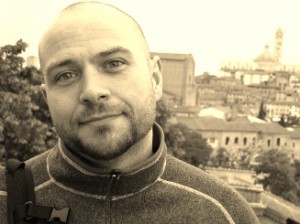Graham Segroves
Learning and Development for a Complex, Ever-Changing World
Where will you be twenty years from now? How will you be using what you are learning today? Which of the experiences that you value today will still matter an ounce to you then? What will you be grateful for after you’ve stumbled and soared across twenty more years and thousands more miles?
Nobody can know the answers to these questions, because such wisdom arrives only in hindsight. As I look back today, the remarkably motley fabric of my past twenty years sparkles frequently with the (blue and) golden fibers of three core values, experiences, and lessons learned inside classrooms and beyond:
- UD and FLL encouraged me to pursue excellence and to achieve big, bold goals. Even before I arrived at UD in Tennessee as a freshman in 1992, I was, well, somewhat of an overachiever. High school Latin brought me to undergraduate Italian, the gateway drug for French and, later, German. I paired an international relations major with an obscure FLL concentration called “Four Languages,” which at one point saw me enrolled in three different languages’ courses in the same semester. I became closely familiar with many of the FLL faculty because I was the student of so many of them – all while helping start up a Ray Street community, writing for The Review, and being appointed by the governor to the Delaware Community Service Commission where I helped select and monitor AmeriCorps and other programs for my adopted state.
- FLL also awakened my enthusiasm for the vocation of learning and development. Inspired by now-retired FLL faculty Dr. Gabriella Finizio and Dr. Bonnie Robb, I decided to remain at UD for a master’s in the newly established foreign language pedagogy program. As a grad student, I taught Italian while studying French lit. (There is no fear like teaching an introductory section of Italian for the first time, solo, as a just-graduated twenty-one-year-old, and no sense of accomplishment afterward so satisfying, either). My students became my passion, and my instructor partners, my colleagues.
- My FLL experience broadened my worldview and cultivated my passion for understanding human differences. Two undergrad winters and an inaugural semester in Siena turned me into a travel junkie and xenophile. I chaperoned the Siena winter session a third time as an undergrad senior, then, as a grad student, I spent a winter in Bayreuth with undergrads. Finishing my MA in 1998, I had never spent much time in France; instead, I spent that summer cultivating a beautiful and distinctive Quebec joual at Université Laval. (I have willingly accepted being mistaken for Canadian while in Europe or North Africa as a fine compliment). Leading an excursion that connected the metaphoric lands of effective learning and social change, I presented the American Council on the Teaching of Foreign Language’s first-ever national conference session on “Understanding the Impact of Invisibility on Gay Foreign Language Learners.”
At the end of my time at UD, packed full of language ability, wanderlust, and passion for learning and teaching, I moved to Washington, DC, for a second MA in international affairs. I had been equally flattered and frustrated when the literature professors urged me to switch tracks and pursue a PhD in literature; instead, I felt compelled to examine and celebrate the living language of the streets, jokes, subway systems, and workplaces of the world: I wanted to put the language to use. I also wanted to make the world a better place, first through civil rights advocacy at the National Gay and Lesbian Task Force, then through international development work at the National Democratic Institute for International Affairs, and later through a rewarding decade of service at the Central Intelligence Agency.
It was at the CIA where I put my UD FLL experience to most rigorous use – not only foreign language ability, but also the capacities I had developed there for achieving big goals, thinking critically, communicating effectively, and effectively navigating cross-cultural encounters. Entering on duty in the long shadow of the events of 9/11, I managed intelligence reporting related to counterterrorism, terrorism finance, and weapons of mass destruction for five challenging years. I supervised staff and contractors, helping them learn, grow, and succeed. I served as a legislative fellow supporting Congressman Keith Ellison, the first Member of Congress to be a person of Muslim faith. I led diversity and organizational change efforts within the Clandestine Service and elsewhere throughout the CIA.
Then I shifted my professional focus to executive leadership development and change management before leaving the CIA in 2012 to enter private practice as a coach and organizational effectiveness consultant. Many of my clients today are in global organizations like the World Bank, the International Monetary Fund, or the U.S. Intelligence Community, where cross-cultural agility is key, even when the common language is English. More concretely, designing learner outcomes and individual development plans today summons my experience in FLL creating lesson plans for Italian 105.
No, I don’t speak French, German, or Italian every day, twenty years later, nor do I stand before a classroom of language learners or publish papers about Calvino’s genius or Molière’s wit. Yet in many ways I’ve come unexpectedly full circle, back to my roots of learning about and embracing our human differences of expression and culture, beliefs and styles – and helping leaders and organizations face the challenges of effective performance in our complex and changing world.
This entry was posted in Polyglot and tagged French, Spring 2014 Polyglot.

